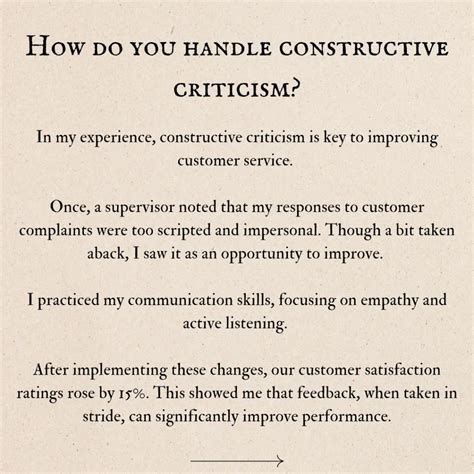How Do You Handle Criticism Interview Question
Ronan Farrow
Apr 04, 2025 · 3 min read

Table of Contents
How to Handle Criticism: Acing the Interview Question
The interview question, "How do you handle criticism?" is a classic. Interviewers ask this not just to gauge your resilience, but to understand your self-awareness, learning agility, and overall professionalism. A poorly handled response can derail your chances, while a well-crafted answer can significantly boost your candidacy. Let's explore how to effectively navigate this crucial interview question.
Understanding the Interviewer's Perspective
Before diving into crafting your response, it's vital to understand why interviewers ask this question. They want to see:
- Your self-awareness: Can you objectively assess your performance and identify areas for improvement?
- Your emotional intelligence: How do you react to negative feedback? Do you get defensive, or do you approach it constructively?
- Your problem-solving skills: Can you analyze criticism, identify root causes, and implement solutions?
- Your growth mindset: Are you open to learning and development, or do you resist feedback?
- Your professionalism: Do you handle difficult conversations with grace and maturity?
Crafting Your Winning Response: A Step-by-Step Guide
Here's a structured approach to crafting a compelling and memorable answer:
1. Acknowledge and Validate the Criticism
Begin by acknowledging that criticism is a valuable part of growth. Phrase your response to demonstrate your receptiveness to feedback. For example:
- "I believe constructive criticism is essential for professional development. I actively seek it out because it helps me identify areas where I can improve."
- "I understand that criticism is part of any job, and I see it as an opportunity to learn and grow."
2. Describe Your Process for Receiving and Analyzing Criticism
This section is crucial. Explain your process in a concise and organized manner. You might say:
- "When I receive criticism, I first listen carefully and try to understand the perspective of the person giving the feedback. I ask clarifying questions if needed to ensure I fully grasp their concerns."
- "I then take some time to reflect on the criticism. I analyze what aspects of my performance need improvement and identify any patterns or recurring issues."
3. Highlight Your Actions Based on the Feedback
This is where you showcase your proactive approach. Describe specific steps you took to address the criticism. Use the STAR method (Situation, Task, Action, Result) to structure your response:
- Situation: "For example, during a project last year, my manager pointed out that my reports lacked sufficient detail."
- Task: "My task was to improve the clarity and completeness of my reports."
- Action: "I implemented a new system for organizing my data, and I began using more visual aids to highlight key findings. I also scheduled regular check-ins with my manager to ensure I was on the right track."
- Result: "The result was a significant improvement in the quality and effectiveness of my reports, leading to better collaboration and clearer communication with my team."
4. Emphasize Continuous Learning and Improvement
Conclude by reinforcing your commitment to personal and professional growth. This demonstrates a growth mindset, which is highly valued by employers. You could say:
- "I continually seek ways to refine my skills and improve my performance. I believe that continuous learning is crucial for success, and I embrace criticism as a vital tool in this process."
- "I am always looking for opportunities to learn and grow, and I view criticism as a stepping stone toward achieving my full potential."
Key Considerations
- Be specific: Use concrete examples to illustrate your points. Vague statements are unconvincing.
- Stay positive: Maintain a positive and professional tone throughout your response.
- Be honest: Don't try to portray a perfect image. Everyone makes mistakes. Showing self-awareness and a willingness to learn from them is more impactful.
- Tailor your response: Adapt your answer to the specific job and company culture.
By following this structured approach, you can confidently address the "How do you handle criticism?" interview question and leave a lasting positive impression on the interviewer. Remember, it's not just about how you handle criticism, but also about how well you articulate your approach.
Featured Posts
Also read the following articles
| Article Title | Date |
|---|---|
| How Hot Does Denatured Alcohol Burn | Apr 04, 2025 |
| How Do You Know When Septic Tank Needs Emptying | Apr 04, 2025 |
| How Great Thou Art Trumpet Sheet Music | Apr 04, 2025 |
| How Do I Identify My Antique Drawer Pulls | Apr 04, 2025 |
| How Far Can A Truss Span | Apr 04, 2025 |
Latest Posts
-
How Long Do I Soak My Invisalign In Crystals
Apr 05, 2025
-
How Long Do I Leave Tea Bag On Tooth
Apr 05, 2025
-
How Long Do I Leave Tape On New Windshield
Apr 05, 2025
-
How Long Do I Keep A Zyn Pouch In
Apr 05, 2025
-
How Long Do I Have To Wear Rubber Bands
Apr 05, 2025
Thank you for visiting our website which covers about How Do You Handle Criticism Interview Question . We hope the information provided has been useful to you. Feel free to contact us if you have any questions or need further assistance. See you next time and don't miss to bookmark.
